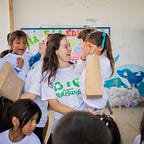Once the Clock Finally Strikes
It is frustrating when we want something desperately at a certain time in our lives, and we don’t get it. It is harder, though, when we finally get a hold of it and yet somewhere along the way, we lose it.
Meet Anita Bitar, alumni of Franklin Delano Roosevelt and a current board member of the school, who has shared her pregnancy journey.
Her story began when she met her soon-to-be husband, Fernando, at Duke University in 1998. Not long after they finished their undergraduate studies, they got married and moved to Venezuela. About five years after they got married, they decided to start trying for kids, and soon Anita was living through her first pregnancy.
“I didn’t have any problems with fertility; I got pregnant very quickly. I was so happy and told everyone.” Anita said when asked about her first unborn child. Sadly, this emotion was short-lived; a few weeks after finding out she was carrying her first child, she dealt with her first miscarriage.
“I was actually at a café with a good friend of mine. We were having lunch, and I went to the bathroom, and (I noticed that) I had started spotting.” She was worried. Who wouldn’t be? So Anita told her friend, and she assured her it was normal. But even after consulting a doctor, she miscarried very early on, around seven weeks in.
It was only a little more than a few months later when she got pregnant for the second time. “That time, I remember, it was longer, but soon I started spotting, and the same thing happened.” Although devastated and frustrated, she could understand that these things happened and continued her motherhood search.
Yet, some months later, she underwent her third miscarriage. She was still living in Venezuela, with only having passed a year since her first one. With this pregnancy though, she took blood samples to see if her hormones were alright. Constantly checking her results; everything looked to be in order, but when she went to the doctor to confirm, they realized they had made a mistake with the samples and had given them to the wrong patients; the hormone levels she had received were not hers. It was longer than the last two times, but the pregnancy did not come to fruition once again, this time having a heavier impact on both parents.
Understandably, she started losing hope and fear invaded her body.
When asked how she felt, she said she couldn’t recall most of the events because of the trauma that settled into her, but she does remember, “the electricity throughout my body and the frustration. Even though I was super afraid, the fear did not paralyze me; it energized me to keep going.”
She decided to reach out to every doctor she could find who specialized in recurrent pregnancy loss, a term she was diagnosed with after her third miscarriage. They had even gone to Panama to consult a doctor who had experience in this area. Science told them they weren’t going to be able to have a child; it even went as far as saying that they were incompatible. But one doctor, in particular, told them to keep trying and not give up. He gave her anticoagulants to treat genetic issues that they had found.
The encouragement she got from these conversations motivated her to keep trying, but she soon had her fourth and fifth miscarriages. At this point, she doubted she was ever going to have a child of her own. She and Fernando started discussing the possibility of adopting. After her husband had eye surgery, they went on a trip to Medujore, where both she and her husband connected with God.
“I have always been religious, but before this experience, I didn’t believe it.” It was here where she had a religious experience. She told God, “If you decide it is right for us to have a child, then let it be, but if it’s not our path, we will find a way even if it is to adopt.”
A week after they returned to the United States, Anita found out she was carrying her 6th child, but this time, her firstborn.
She is now the mother of three healthy boys: Joaquin, who is ten years old, Elias, who is nine, and Antonio, who is seven.
When asked if she would’ve changed her experience, she responded, “I wouldn’t have had it any other way, and I would do it again if I had to have my three kids the way they are.”
“It taught all of us that time is not ours. That time, we manage it, that it is a gift, but at the same time that it is not for us to decide when or what or how things happen.” It is frustrating when we want something desperately at a certain time in our lives, and we don’t get it. But that frustration vanishes once we realize the importance of timing. Enjoy the moment, they say. How about we start by living in it first?
